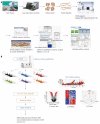Predictive proteomic biomarkers for inflammatory bowel disease-associated cancer: where are we now in the era of the next generation proteomics?
- PMID: 25309077
- PMCID: PMC4188898
- DOI: 10.3748/wjg.v20.i37.13466
Predictive proteomic biomarkers for inflammatory bowel disease-associated cancer: where are we now in the era of the next generation proteomics?
Abstract
Recent advances in genomic medicine have opened up the possibility of tailored medicine that may eventually replace traditional "one-size-fits all" approaches to the treatment of inflammatory bowel disease (IBD). In addition to exploring the interactions between hosts and microbes, referred to as the microbiome, a variety of strategies that can be tailored to an individual in the coming era of personalized medicine in the treatment of IBD are being investigated. These include prompt genomic screening of patients at risk of developing IBD, the utility of molecular discrimination of IBD subtypes among patients diagnosed with IBD, and the discovery of proteome biomarkers to diagnose or predict cancer risks. Host genetic factors influence the etiology of IBD, as do microbial ecosystems in the human bowel, which are not uniform, but instead represent many different microhabitats that can be influenced by diet and might affect processes essential to bowel metabolism. Further advances in basic research regarding intestinal inflammation may reveal new insights into the role of inflammatory mediators, referred to as the inflammasome, and the macromolecular complex of metabolites formed by intestinal bacteria. Collectively, knowledge of the inflammasome and metagenomics will lead to the development of biomarkers for IBD that target specific pathogenic mechanisms involved in the spontaneous progress of IBD. In this review article, our recent results regarding the discovery of potential proteomic biomarkers using a label-free quantification technique are introduced and on-going projects contributing to either the discrimination of IBD subtypes or to the prediction of cancer risks are accompanied by updated information from IBD biomarker research.
Keywords: Biomarker; Colitic cancer; Inflammatory bowel disease; Proteomics; Tailored medicine.
Figures



References
-
- Vucelic B. Inflammatory bowel diseases: controversies in the use of diagnostic procedures. Dig Dis. 2009;27:269–277. - PubMed
-
- Nikolaus S, Schreiber S. Diagnostics of inflammatory bowel disease. Gastroenterology. 2007;133:1670–1689. - PubMed
-
- Xavier RJ, Podolsky DK. Unravelling the pathogenesis of inflammatory bowel disease. Nature. 2007;448:427–434. - PubMed
Publication types
MeSH terms
Substances
LinkOut - more resources
Full Text Sources
Other Literature Sources
Medical

